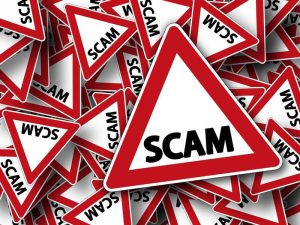Energy Scams:
 A caller identifying himself as “Greg Miller” (and other names) calling from PEPCO warning the consumer that their power would be shut off due to unpaid bills. The caller leaves a toll-free number and extension. When the consumer calls that number back, the outgoing message sounds very like what a PEPCO caller would hear if they were actually calling PEPCO.
A caller identifying himself as “Greg Miller” (and other names) calling from PEPCO warning the consumer that their power would be shut off due to unpaid bills. The caller leaves a toll-free number and extension. When the consumer calls that number back, the outgoing message sounds very like what a PEPCO caller would hear if they were actually calling PEPCO.
If you receive a call from someone claiming to be a PEPCO representative about a bill that does not sound familiar and threatening to shut off your power, hang up and call PEPCO directly at the number that appears on your monthly bill to see if the call was legitimate. Also, consumers report door-to-door vendors claiming to be PEPCO but may not be. In fact, PEPCO issued a press release about scammers contacting consumers about alleged delinquent accounts. The scammers seek payment by pre-paid debit cards Police warned.
Similarly, door-to-door salesman will identify themselves as working for your energy supplier, ask to see a bill, and offer discounts and better deals. Your account information is on your bill and you may be slammed into unwanted contracts with a different energy supplier (without your knowledge or consent). Since PEPCO would still service the bill, you might not even know your supplier has been switched. Consumers report aggressive sales tactics where the salesperson refuses to leave until they see a bill so they can “check off” your name from their list. Do not show them your bill and shut the door.
Slamming (Switching Energy Supply Companies)
“Slamming” is the practice of switching your electric or gas supplier without your consent and is another favorite of scammers. So, you wonder how scammers are able to switch your energy supplier? Remember Maryland is a choice state, so you can choose a different energy supplier. So for electricity, you might choose the default supplier or switch to solar, wind or other energy source. No matter the supplier of electricity, your utility (PEPCO, BGE or Potomac Edison Company) would still deliver the energy, respond to emergencies, and send your bills. Here’s where the scammers come in.
Legally, a salesperson comes to your door, or calls you on the phone, to ask if you want to switch energy suppliers and pitches their product or claims to have a better rate than your current supplier. Scammers might not take no for an answer and switch your supplier anyway. They may claim to be “from your utility company” or “the government” and ask for your account number or ask to see your bill in order to determine if you are eligible for refunds or discounts. Your bill has your account number which is how they make the switch. Absolutely, under no circumstances show these individuals a copy of your bill or give them your account number. In some instances, the person at your door may try and create a sense of urgency or even threaten not to leave your property until she’s seen your bill. This is your home so you can simply close your door.
If at a later time, you decide to change your supplier company, do your homework and research which company will be the best fit for you. The Montgomery Energy Connection website can help you research programs and options on your energy consumption.
The AARP has more information regarding this slamming scam on its website. If you have questions about who your electricity supplier is, please contact your utility. In Montgomery County, that could be Potomac Electric Power Company (PEPCO), Baltimore Gas and Electric (BGE), or Potomac Edison Company.
The Maryland Public Service Commission (PSC) also has a website where consumers can shop and compare offers from different energy suppliers for electricity. The PSC website explains how you can change from one retail electricity supplier to another. Only the new electricity supplier you choose can switch your service from your current provider. The PSC website also has information about consumers’ rights and it contains a list of all licensed suppliers and utilities with their contact information. It also has links to the PSC’s online complaint portal. The PSC expects to launch a companion site for natural gas shoppers soon.
Home Energy Audit Scam
As the Department of Energy notes, home energy audits can save you money and improve the comfort of your home. Similar to how scammers approach homeowners in utility switching, someone posing as a utility worker or a reputable business comes to your door offering a free home energy audit. Within a short period of time, the individual at your door will begin a sales pitch on how wonderful their product or service is. One way to counter these scammers is to be as direct as possible and request to see proof of employment or ID as well as their required door to door salesmen’s license.
Scammer will be reluctant or unwilling to produce these forms of identification. If the salesman cannot verify who they work for or the employer identification does not match up with what they have told you, then chances are they are a fraud. So, what’s the best way to deal with a fraud? By closing the door then confirming with your utility or supplier and inquire if they had contractors in your area. Two examples of legitimate home energy audit firms would be the EmPOWER Maryland program offering Quick Home Energy Checkups at no cost and Home Energy Audits for $100. EmPOWER Maryland will not usually come door to door and they do not do robocalls. Call your utility to learn more about those programs. The AARP provides further information on this scam.
